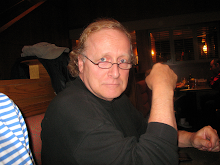In "Odysseus in America: Combat Trauma and the Trials of Homecoming," published in 2002, Shay draws parallels between the perilous, 10-year journey home of Odysseus from the Trojan War and the psychological odyssey of veterans returning to civilian life.
Like the hero of the "Odyssey," whom Shay depicts as conniving and explosively violent as he travels the world battling monsters, veterans of contemporary wars are often danger-seekers.
In his book, Shay cites the example of a Navy veteran from South Boston who was the only member of his boat crew to survive an explosion in the Mekong Delta on March 17, 1968, during the Tet Offensive. For years on the anniversary of
the explosion, this veteran, whom Shay calls Wiry, "would go into a really rough
fighting bar in Southie and just attack the meanest, toughest-looking guy in the
bar and get himself beat up," Shay told the Globe.
Today, troops returning from Iraq and Afghanistan tell similar stories about their mental struggles. Shay believes that the analogies he draws in his books can be useful to help reduce and treat psychological trauma among those veterans.
"As long as human beings go to war and try to come home from war, these [epics] will speak to us," he said of the "Iliad" and the "Odyssey." "They truly hold up all that is generic about going to war and coming home from war."
Shay's books are "a wonderful resource for both clinicians and vets and their loved ones," said Keith Armstrong, a San Francisco psychiatrist and one of the authors of "Courage After Fire," a guide book on coping with trauma for troops who are returning from Iraq and Afghanistan and for their families.
Chronic Illness Recovery-One Step At a Time
7 years ago





No comments:
Post a Comment